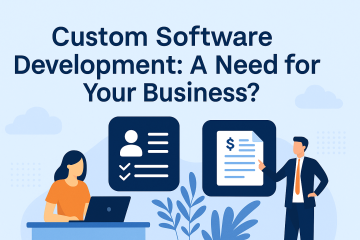Running a small business means wearing many hats. From managing operations and customer service to hiring the right people, every decision counts. But when it comes to managing employees—handling payroll, attendance, leaves, compliance, and performance—manual work often leads to errors, inefficiency, and delays. That’s where a strong human resource management system becomes not just helpful, but essential. Small businesses often skip investing in HR tools thinking they’re only for large enterprises. The truth is, the right software can simplify HR for businesses of any size. With digital transformation sweeping every industry, smart HRMS software now come at a cost even startups can afford. And they save time, reduce paperwork, and help business owners stay focused on growth.
This blog will walk you through how small businesses can benefit from adopting a modern human resource management system, what features to look for, and how DI Infotech’s expert digital strategies can help your HR tech solution.
Understanding the Role of HR in Small Businesses
For small teams, human resources might seem like a secondary priority—but it actually plays a central role in building a strong, sustainable business. When there are only 10, 20, or even 50 employees, each person has a big impact on operations, performance, and growth. That’s why managing people the right way becomes even more important.
Small business owners often try to handle HR tasks themselves—like tracking attendance, calculating salaries, storing documents, and resolving employee concerns. But as the team grows, these tasks become harder to manage manually. Mistakes in compliance or payroll can lead to penalties, while poor employee experiences can cause high attrition.
This is where a human resource management system helps. It provides small businesses with a digital way to manage HR activities accurately and efficiently. From employee onboarding to time tracking, leave approvals to performance reviews, a good HRMS software brings all tasks into one streamlined system—saving hours of admin work each week.
When used correctly, HR tools not only reduce operational stress but also create a professional and trustworthy environment for employees to work in. That’s essential for small businesses that want to attract and retain top talent.
Why Small Businesses Should Invest in HR Tech Now
In 2025, employee expectations have evolved. People want more than just a salary—they want clarity, structure, and a company that values their time and growth. For small businesses competing with larger firms, providing a professional HR experience is no longer optional—it’s a necessity.
Manual HR processes are time-consuming, error-prone, and difficult to scale. Paper forms, Excel sheets, and back-and-forth emails lead to confusion and delays. This not only affects productivity but also damages the credibility of a business in the eyes of current and future employees.
By switching to a human resource management system, small businesses can gain control and confidence. These systems automate repetitive tasks like leave management, employee records, compliance reports, and payroll syncing. That means fewer errors, faster decisions, and more time to focus on growth.
A good HR management software gives visibility into team performance, helps track attendance in real time, and creates a digital trail of all HR activity. This helps business owners make informed decisions about hiring, budgeting, and employee well-being.
With easy-to-use interfaces and mobile-friendly access, many modern tools are designed especially for small businesses. That means no need for a dedicated HR department—just the right tech to manage people better.
What Features to Look for in the Best HRMS Software in India
Choosing the right human resource management system is a strategic move. It should support your business goals, adapt to your team’s size, and simplify core HR functions. For small businesses, the focus should be on usability, affordability, and time-saving features.
One key feature is automated attendance tracking. This eliminates manual registers and lets you know exactly who is working and when. Tools with biometric or GPS-based check-ins are especially useful for hybrid or remote teams.
Another must-have is payroll integration. A well-connected HR management software ensures that data flows directly from attendance and leave systems to payroll without errors. This makes monthly salary processing fast, transparent, and compliant with Indian tax laws.
Employee self-service portals are equally important. They reduce HR workload by allowing employees to access their payslips, request time off, and update personal information without emails or calls.
For small businesses focused on performance, task tracking and appraisal tools make it easy to review work regularly and set growth targets. These features, when used consistently, increase accountability and encourage development.
Also, look for document management, onboarding modules, and reporting dashboards. These keep your HR records secure, improve the onboarding experience for new hires, and offer insights into team dynamics.
The best HRMS software in India doesn’t overwhelm you with features—it simplifies your daily operations and grows with you as your team expands.
How a Human Resource Management System Solves Real Problems for Small Businesses
Running HR in a small business often feels like juggling too many tasks with limited hands. You may not have a full-time HR team, yet you still need to manage salaries, attendance, hiring, and employee concerns. That’s where a reliable human resource management system steps in to solve everyday pain points.
For starters, it eliminates dependency on spreadsheets. Manual data entry leads to errors in salary calculations, leave tracking, and record-keeping. An HRMS automates this, saving time and improving accuracy. You don’t have to worry about miscalculations or missed updates.
Recruitment becomes easier, too. Instead of sorting resumes in your inbox, a good hr management software gives you structured candidate pipelines, interview tracking, and offer letter templates in one place. It helps speed up hiring while keeping communication professional and timely.
Handling payroll and compliance is another major relief. Whether it’s TDS deductions, PF contributions, or ESI filings, the best HR management software in India ensures nothing is missed. It sends reminders, calculates deductions, and even generates payslips on time.
Small business owners also struggle with employee engagement. A quality HR tool includes feedback systems, surveys, or even birthday reminders that make team members feel seen and valued. This directly contributes to retention and workplace happiness.
Lastly, having an HRMS means data is centralized and secure. Whether it’s employee performance history or resignation records, you’ll never have to dig through old emails or unorganized folders again.
With minimal cost and maximum value, an HRMS is no longer optional—it’s a smart business decision for small teams trying to stay lean and efficient.
Why Small Businesses in India Prefer Cloud-Based HRMS Solutions
Cloud-based human resource management systems have gained strong traction among Indian small businesses—and for good reason. They eliminate the need for bulky hardware or constant IT support, making them cost-effective and easy to set up.
One major advantage is accessibility. Cloud HRMS platforms allow business owners and employees to access data from anywhere, anytime. Whether you’re working remotely, on a business trip, or simply managing multiple branches, your entire HR operations are just a login away.
Another key reason is scalability. As a small business grows, so do its HR needs. A cloud-based best HRMS software in India can grow with you—offering modules like performance tracking, learning and development, or advanced analytics without requiring a full system overhaul.
Security is also a strong point. Most cloud HRMS platforms offer encrypted access, regular data backups, and role-based permissions. This ensures that sensitive employee information is protected without hiring an IT security expert.
Automatic updates keep the system compliant with changing labour laws and tax rules, especially crucial in India where compliance is dynamic. Business owners don’t need to worry about keeping up manually—the system does it for them.
Cost is always a concern for startups and SMEs. Cloud HRMS platforms typically operate on a subscription model, making them affordable. There are no upfront costs, and businesses pay only for what they use—ideal for tight budgets.
When you combine convenience, flexibility, and affordability, it’s no surprise that cloud-based HR management software is the top choice for Indian businesses aiming to stay agile and competitive.
Why DI Infotech Supports Smart HR Systems for Growing Businesses
At DI Infotech, we’ve worked with hundreds of small and medium-sized businesses across India—and we understand what growth truly looks like. In every growing company, one common bottleneck is outdated or disorganised HR processes. Businesses struggle not because they lack talent or opportunity, but because managing that talent becomes chaotic without proper systems in place.
This is why we believe in the power of smart HR tools like a human resource management system. These tools make hiring, onboarding, payroll, and employee tracking more efficient. They help growing businesses reduce errors, save time, and maintain compliance, even with a small team.
Final Thoughts on Smart HR for Small Businesses
Managing HR tasks manually can slow down your growth and create avoidable issues in payroll, attendance, or employee data. A smart and reliable human resource management system helps small businesses run smoother, stay compliant, and keep employees satisfied. It’s not just about automation—it’s about building a stronger, more organised foundation for growth.
The best part? You don’t have to figure it all out on your own. At DI Infotech, we help small businesses discover and adopt the best HRMS software in India that matches their needs.
Investing in the right HRMS tool today means saving time, improving accuracy, and focusing more on growing your business tomorrow.



0 Comments